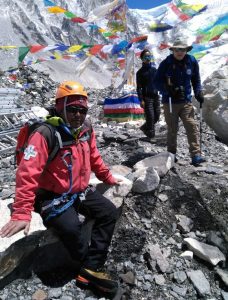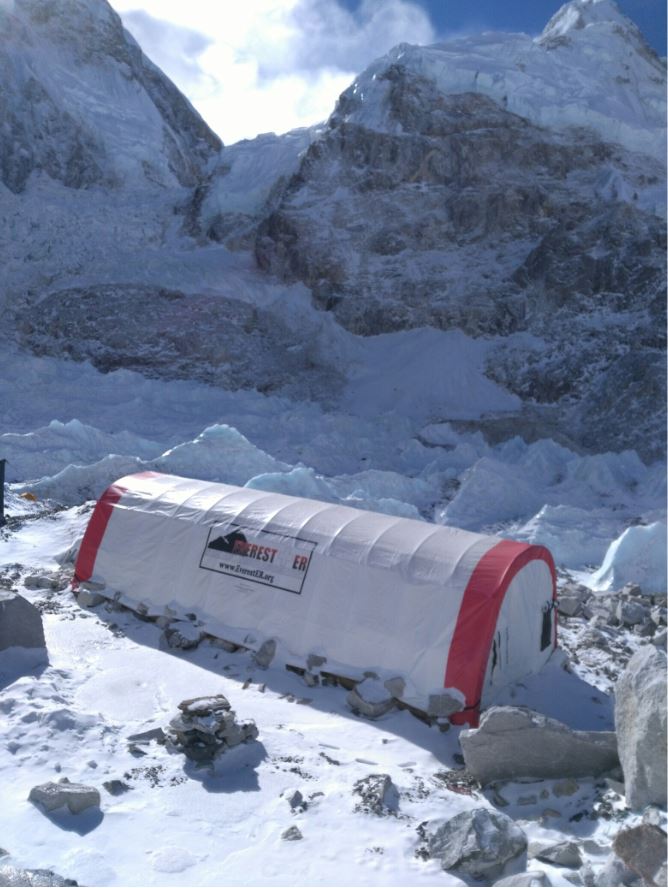Episode 4.1: We could be heroes
By: D. Deonarain
“You are… heroes!”
How awkward. If you have never been called a hero in your life, don’t wish for it. It’s an awful feeling. Really. Awful. In that moment, after those words had been let loose, I stood, unspeaking, shifting from one foot to the other then smiled—dismally. She, on the other hand, beamed. For her, it was a smile that sat broadly on her face, but was filled from a well from deep within her, from a core of exuberance and emotion. I wished I was somewhere else, maybe my tent. It would still be warm at this time of day. I think she could sense my objection to her statement in my body language because she persisted.
“No, really, I think you guys are heroes!”
Again that word.
I looked over at my Nepali colleague, Pawan and wondered how he felt. He seemed at ease, but then again he often did. He was smiling. He had that lovely Nepalese quality of outward serenity that he could carry through almost any situation. Neither of us spoke.
Our patient was a Lebanese woman on the verge of completing the ‘Seven Summits’—the summiting of the highest mountain on every continent on Earth. By doing so, she would become the first Lebanese woman to complete this challenge—and she was calling us ‘heroes’ for volunteering at the emergency hospital Everest Base Camp. This thought was strange and discordant.
The closest I think I’ve come to being a hero was in my second year of school. I was in a class with a bully who was as mean as he was big. He had failed a grade and had an extra year of childhood bulk to him and perhaps harboured a certain resentment about his plight. He took pleasure in tormenting the other children in my class, subjecting them to absurd physical abuse during our class breaks. One afternoon, no different from any other afternoon, I had, in my young mind, decided that enough was enough. I made my way over to him and told him to stop harassing the other kids. He, naturally, laughed. I was undersized in both words and stature and to him and posed no threat. In a moment of courage, or madness, or both, I gave him an almighty shoved in the chest. Not expecting this, he lost his footing and was lifted into the air only to fall hard on his back. I can still remember his animalistic attempts to catch his wind, the tears already pooling in his wide eyes. I stood over him and said only one thing: “Enough.” My victory was short lived though. He made it back to his feet and sent a firm fist into my doughy boy face. The pain was searing, and I could feel that even in that instant my face was swelling from the impact. In wasn’t long before the teacher arrived on seen and dragged us both to the school principal’s office. Although, I was handled roughly in this trip to the office, I smiled all the way, face swelling and all. The bully, he couldn’t stop crying. Although I’m not a man who condones violence, maybe this was a first and embryonic thought, a lesson that I would carry with me well into manhood: It’s not only what you stand for, but what you stand up for…
Me, I believe in equitable health for all. In a world where the discrepancies of health follow those of wealth, it’s hard to remain optimistic. The wealth and health gap continues to stretch, to widen, and to swallow those less fortunate. In New Zealand, like so many countries, wealth is becoming concentrated in fewer and fewer hands and health outcomes for those left behind risk following a downward slide. In Nepal, at Everest, health and wealth collide in an unexpected way. Monied climbers from all corners of the globe spend tens of thousands of dollars to climb and snap pictures at the summit of the world’s highest mountain. They do so, quite literally, on the backs of the Sherpa people who guide them with diligence and care through treacherous ice and snow. Sherpas who criss-cross the dangerous Khumbu ice fall beneath heavy seracs and whom have summited themselves scores of times. They do so also on the backs of the Tamang and Rai people who porter unwieldly loads of gear to base camp, trip after endless trip, so that the expeditions are left in want of nothing. Sadly, the health of these workers seems still to take a backseat to the privileged who seek the summit. They often warrant barely a mention.
I know their struggles. I see them at Everest ER. They come to us in droves. They come with altitude illness, with ‘Khumbu coughs’ that have progressed to bronchitis, with cuts and scrapes from the rocky trail, with burns from spilt petrol, with frostbite, with snow blindness and the peeling skin of deep sunburns. They come for treatment and we provide it. And so it is my colleagues and I sleep in tents at altitude, endure the frigid nights when the mercury plummets to -20C and the cold stones can be felt through our mattresses, sip the thin dry air and struggle to get enough precious oxygen ourselves. We suffer a little in the hope that others might suffer less by our help…
…but I am not a hero, nor am I a martyr. I am a spoke in a wheel that is turning against a machine of increasing wealth, expectation, and privilege. As a volunteer doctor here in Nepal, my contribution when all is said and done may end up being very small, but I try to let go of this outcome. In my fervent belief, it is more important to be true to your dharma, even if it amounts to little, rather than go against it and live greatly, though falsely.
In my quiet moments, here in the impossible quiet of the Himalayas, I realise something: There are many heroes here. I treat them every day.

Chemical burn

An ‘ice doctor’ taking a break
Stormy night at base camp

Dr Dinesh Deonarain is a Fellow of the Royal New Zealand College of Urgent Care who is in Nepal on assignment. He is volunteering for the Himalayan Rescue Association as one of the Everest ER base camp doctors for the 2019 climbing season. This blog follows his experiences in the high alpine of the Everest region.
Listen to the Profile in Urgent Care podcast with Dr Dinesh Deonarain.
If you would like to support Everest ER and the Himalayan Rescue Association, you can donate by bank transfer to: BNZ 02-0800-0196128-000. Also, you can follow Everest ER this season at www.EverestER.org
Boots on Everest – Episode 1
Boots on Everest – Episode 2
Boots on Everest – Episode 3 – Part 1
Boots on Everest – Episode 3 – Part 2
Boots on Everest – Episode 3 – Part 3
